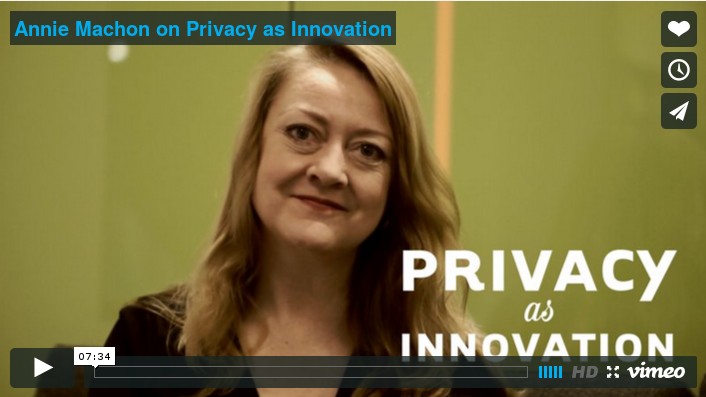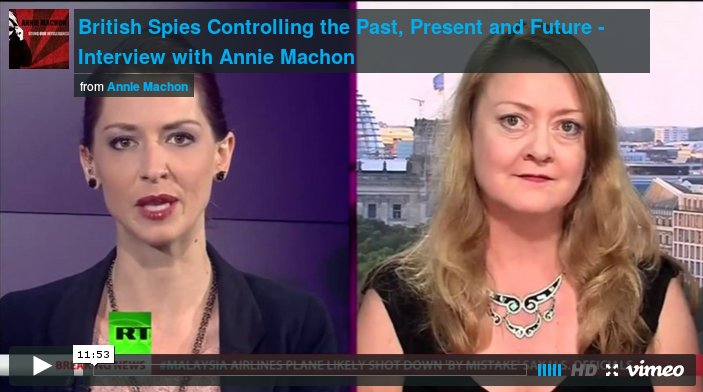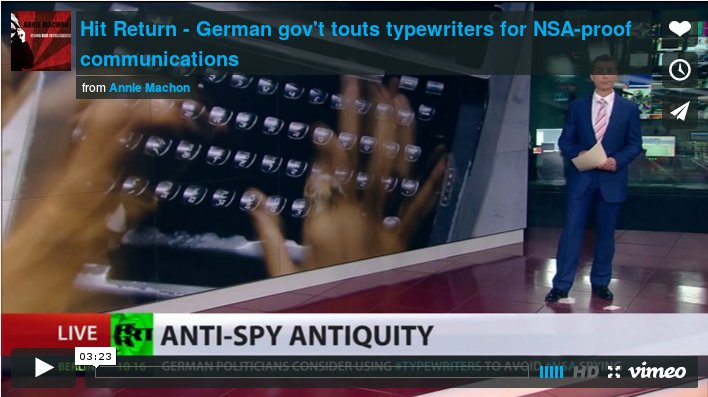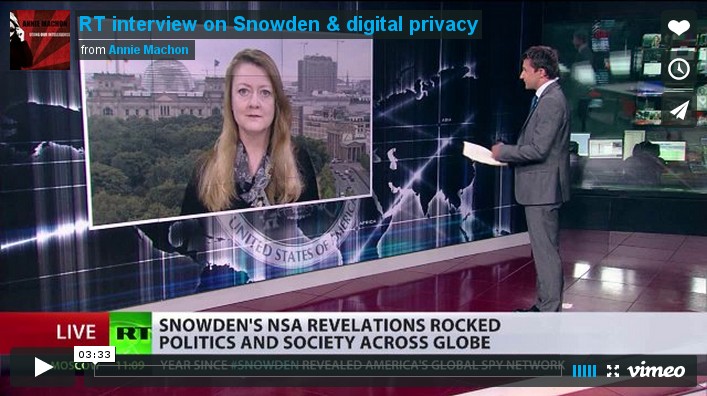A recent interview I gave while in Stockholm to the Privacy as Innovation project:

A recent interview I gave while in Stockholm to the Privacy as Innovation project:

Here’s my interview from yesterday on RT’s excellent Breaking the Set show with host, Abby Martin. We discussed all things spy, surveillance, Snowden, oversight, and privacy. A fun and lively interview! Thanks, Abby.

A comment piece from last week on RT about German politicians wanting to go back to paper-based communications to evade the US spy panopticon:

And here is the full text of the interview I gave on RT Op Edge:
Both typewriter and strong encryption is going to slow down communication, but upholding a basic democratic right of privacy seems to be more important, former MI5 agent Annie Machon told RT.
Amid the American-German espionage scandal, German politicians are considering going back to old-fashioned manual typewriters for confidential documents in order to protect national secrets from American NSA surveillance.
RT: Why would Germany think of using typewriters as a security measure?
Annie Machon: What I find interesting is that we have a situation where even our democratically elected representatives have to think deeply and seriously about how to protect the privacy of their communications, particularly when the investigation of the very subject of invasion of the privacy of the citizens, which is what the Bundestag at the moment is doing in Germany, trying to hold hearings to work out what exactly the NSA has been doing, which might be contravening the constitution of Germany. It is very difficult now but it is still possible to protect your electronic communications, but I think this announcement, this sort of statement by the Bundestag representative about going back to typewriters is interesting. It just makes a very strong point that we all need to be aware of the fact that we can be spied on at any time.
RT: Do you think everyone would follow Germany’s example?
AM: I think more and more people are concerned about their privacy because of the Edward Snowden disclosures. He has done the world a huge service with great personal cost, exposing the predations of the US Intelligence agencies and the NSA particularly, as well as a number of European agencies. In the past all countries spied on each other because they wanted to gain advantage over other countries, not necessarily their enemies, just an advantage economically or politically. However, what we are seeing at the moment is the result of what was the perfect storm for the USA in the 1990s, it was a perfect opportunity for them, because at that point the Cold War had ended, they were the sole remaining superpower on the planet, and precisely at that moment we had the evolution of the internet, a huge tech explosion of communications. They saw the opportunity and they went for it. Of course they did because that meant that they could embed whatever they wanted into the infrastructure that the whole world now uses for communication. Of course they were not going to turn this opportunity down, and they haven’t. That is what Edward Snowden disclosed.
So we have the situation now when everything can conceivably be hoovered up by the NSA and its vassal states in Europe, everything can conceivably be stored for ever and be used against citizens in the future if the laws change. And everything can conceivably be known amongst the private deliberations of our parliament’s democratically elected representatives. It’s worse than Orwellian.
It would be naïve to think that the US would not take up this opportunity, but of course they did, and these are the results we are living in. It would be lovely to think that we could go back to the era of having privacy in our lives that our governments would have power to ensure we had it, but in this globalized world it is very difficult to ensure that. One of the things that is little known out of all Snowden’s disclosures is the fact that it is not just what we send over the internet, it is also hardware, the computers, the technology we actually use that can already be compromised by the NSA. This is one of the things that came out just after Christmas last year. So we are living in a very complex world but there are very simple steps we can take, both the governments and the citizens, to protect our democratic and our basic right to privacy.
RT:Wouldn’t using typewriters slow things down in terms of communication? Why not use other, more modern ways of protecting communication?
AM: Either going back to using pen paper or typewriter or using very strong encryption is going to slow down one’s communication, there is no doubt about it. The point is though, what is more important, is it access to the latest celebrity gossip on the internet or is it actually upholding a basic democratic right of privacy. Because if we don’t have privacy, then we lose our freedom to communicate easily and in private, we lose our freedom to ingest information via video, audio or from reading, we cannot plan, we cannot conduct private personal relationships over the internet. So what is the price of a little bit of inconvenience when it comes to protecting our basic rights? I think that however light-heartedly the German politician mentioned using typewriters, when it comes to proper security issues within government, he is probably absolutely right. Last year there was a report as well, saying that some of the Russian security operators were now using typewriters too. We will all have to think about that, and it’s just a jolting wake up call to make us all think about that by stating that the German government is now going back to typewriters for certain things.
RT: What kind of solution do you see? Should people rely on their governments for protection of their privacy?
AM: There is a danger that people and the government will become very paranoid about trying to protect against the predations of the NSA and its vassals in Europe. However, I’m not sure as we as citizens can rely on governments to protect our privacy because all governments would want to know what is going on on the internet for legitimate reasons as well, to try to track down the illegitimate criminals and terrorists. But it can be easy for them to hoover up all the personal information and we, as citizens, need that have that guarantee of privacy. So one of the things we can do as citizens is to take responsibility in our own hands. We can indeed source all technologies, source computers pre-2008 that have not built-in hardware backdoors. We can use decent PGP encryption, we can use Tor to hide what we are looking at in the internet, we can use other encryption methodologies to protect our privacy, and we need to. I think it’s a very interesting crossroads in our history, both as civilizations, as democracy and as individuals, but also how we view the technology, how we use it, how we can better use it to protect our life, so that is going it be an ongoing debate. I’m very pleased to see this in Germany particularly. The politicians seem to be waking up around these issues and wanting debate these issues because the USA has got away with it for long enough across the West.
Here is an interview I did on 5th June, the anniversary of the start of Edward Snowden’s disclosures about the global surveillance infrastructure that is being built.

RT interview on Snowden & digital privacy from Annie Machon on Vimeo.
Here is a quick interview I did about the EU’s new data protection measures, laws that will have to be implemented in the wake of Edward Snowden’s disclosures about endemic NSA surveillance:
This is an excellent example of how whistleblowers continue to make a positive contribution to society.
Here’s my recent interview on London Real TV, discussing all things whistleblowing, tech, intelligence, and the war on drugs. Thanks Brian and Colin for a fun hour!
Below is some background material from my submission to the European Parliament’s LIBE Committee on the implications of the NSA scandal.
Here is a video link to the hearing.
LIBE Committee Inquiry on Electronic Mass Surveillance of EU Citizens, European Parliament, 30th September 2013
Biography:
Annie Machon was an intelligence officer for the UK’s MI5 in the 1990s, before leaving to help blow the whistle on the crimes and incompetence of the British spy agencies. As a result she and her former partner had to go on the run around Europe, live in exile in France, face arrest and imprisonment, and watch as friends, family and journalists were arrested.
She is now a writer, media commentator, political campaigner, and international public speaker on a variety of related issues: the war on terrorism, the war on drugs, the war on whistleblowers, and the war on the internet. In 2012 she started as a Director of LEAP in Europe (www.leap.cc).
Annie has an MA (Hons) Classics from Cambridge University.
Background material:
Recommendations:
 I have great pleasure in launching my new, bespoke website — made for me by Sander Venema, the founder of Asteroid Interactive in the Netherlands.
I have great pleasure in launching my new, bespoke website — made for me by Sander Venema, the founder of Asteroid Interactive in the Netherlands.
This is a new company that really listens to what you want, both in terms of design and the back-end system, and I cannot recommend them enough.
So what did I want and why?
First of all, I wanted to get out of the USA domain-name hegemony. Recently the US has been increasingly flexing its legal muscles internationally. It is now claiming global dominion over all the old domains originally set up in its territory: .com, .org, .net, .info, you name it.
And it does not matter if you are are a citizen of another country, living in another country, your website is hosted on another country’s servers, and you have nothing whatsoever to do with the good ol’ US of A: if you use one of these domain names, the US government can pull the plug on your site, with no warning and no redress. This has already started to happen.
So I am now safely ensconced in Switzerland — notably the only country not to take down the Wikileaks website in 2010, despite massive global push-back from the US et al. Switzerland still seems to be taking basic human rights seriously.
The US continually bleats on about the “free market”, so let’s vote with our wallets and remove our custom beyond its pernicious reach.
Secondly, I also wanted to walk the walk and move on to an open source platform and CMS (the software that makes it easy to publish without typing a lot of HTML by hand). This is the only way to ensure that you are not dependent on closed, proprietary software companies, which can be legally pressurised by nasties like the NSA or GCHQ into implanting convenient little “back doors” to spy on or manipulate your data. I made this move on my laptop years ago and have since enjoyed at least a relative sense of security.
Also, as you can see, I value both my privacy and respect yours when it comes to the usual “share” buttons. But I’m also very happy for you to use my material under the Creative Commons Licence.
 And finally, my old site was looking messy — so much information, so little time.……
And finally, my old site was looking messy — so much information, so little time.……
It needed a revamp, and I hope you find this site more user-friendly, and that you can find the information you want quickly. Please feel free to comment, or email me with any thoughts or suggestions.
I think Sander has come up with a beautiful design. The building in the banner incorporates an image of the old Stasi HQ in Berlin. I like the idea — an image of a panoptic police state that seemed brutally immutable, but that has now just.… gone.
